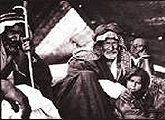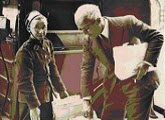
Edge of Darkness: Critical
Nuclear power and nuclear weapons
This month, September 2006, sees the 25th anniversary of the Greenham Common Women's Peace Camp, and also the 50th anniversary of the British atom bomb tests at Maralinga, Australia.
The Archives Hub is highlighting the papers of scientists, politicians and campaigners, as well as the records of organisations, who have sought to limit or end the use of nuclear weapons, have been opposed to nuclear power, or have investigated alternative sources of energy.
We are also highlighting the papers of scientists, engineers, military personnel, politicians, and others involved in the development of nuclear power or nuclear weapons.
Sometimes the dividing line between such views is not always absolute. The nuclear physicist Alec Merrison, for example, also researched tidal energy; some scientists and politicians have supported the civilian use of nuclear energy whilst opposing nuclear weapons; the scientist and senior civil servant Solly Zuckerman, with his diverse interests and activities, appears in both of the two sections that make up this month's feature: Critical and Fission.
Above: Sizewell A and Sizewell B nuclear power stations, photo © Copyright Ashley Dace and licensed for reuse under this Creative Commons Licence.
Collections
- Campaign for Nuclear Disarmament: CND was established in 1958.
- Greenham Common Women's Peace Camp: in September 1981 a group called Women for Life on Earth walked from Wales to Greenham Common, Berkshire, to protest against NATO's decision to site nuclear 'cruise' missiles at the air base there; soon a permanent, women-only peace camp was established outside the base.
- Labour CND: formed in 1979 to promote support for nuclear disarmament within the Labour Party.
- International Physicians for the Prevention of Nuclear War formed in 1980 by a group of Soviet and American doctors
- Movement Against Uranium Mining: pressure group campaigning against uranium mining in Australia.
- Namibia Support Committee: British pressure group in solidarity with the national liberation movement in Namibia, including the Campaign Against Namibian Uranium Contracts.
- New Zealand Nuclear Free Zone Committee: founded in 1980; the campaign succeeded in a change in the law in 1987, so that New Zealand is now the only country in the world with a 'nuclear-free' policy.
- Pugwash Conferences: the first Pugwash Conference on Science and World Affairs was held in 1957, prompted by a manifesto by Bertrand Russell and scientist Albert Einstein.
- Kingsley Martin (1897-1969): journalist, later editor of The New Statesman; Martin chaired the first meeting of the Campaign for Nuclear Disarmament in 1958.
- J. G. Crowther (1899-1983): science journalist; lost his post at the Manchester Guardian newspaper after criticising the American use of the atom bomb against Japan.
- Benn W. Levy (1900-1974): playwright and theatre director; Labour M.P., urged unilateral nuclear disarmament.
- Cecil Frank Powell (1903-1969): Nobel Prize-winning physicist; helped establish and then chair the Pugwash Conferences on science and world affairs
- Dorothy Hodgkin (1910-1994): Nobel Prize-winning chemist; President of the Pugwash Conferences organisation, and involved in Scientists Against Nuclear Arms (SANA).
- Ambrose Walter Holman (1910-1988): member of the Ex-Services Campaign for Nuclear Disarmament Group.
- Frederick Warner (born 1910): chemical engineer concerned with nuclear safety; examined data from the fall-out from the explosion at Chernobyl. established Volunteers for Ionising Radiation.
- Michael Neale Harbottle (1917-1997): Brigadier, UN commander; General Secretary, World Disarmament Campaign, 1980-1982; Member of Generals (retired) for Peace and Disarmament, 1981-1990; Director, Centre for International Peacebuilding, 1983-1997.
- Peter Howard Fowler (1923-1996): physicist; carried out important research into the radioactive fallout from the 1986 Chernobyl nuclear power station explosion in Ukraine.
- Laurence Martin (born 1928): Professor of International Politics, University of Wales; headed study group set up by Parliament to consider the problems of a comprehensive nuclear test ban.
- Liz Fraser (fl. 1982): Liz Fraser and her husband have long been associated with the peace movement.
- Euan Duff (born 1945): photo-journalist who documented the 1960s protest marches from Atomic Weapons Research Establishment, Aldermaston, to London.
Please note: the Archives Hub is not responsible for the content of external websites.
Links
- The Zuckerman Archive: The Chief Scientific Adviser: detailed descriptions of the papers (University of East Anglia)
- Protest and Survive: online version of an exhibition on peace movements held at the Modern Records Centre (Modern Records Centre, University of Warwick)
- Campaign for Nuclear Disarmament: campaigning organisation
- Greenham Common Women's Peace Camp: history of the peace camp
- Greenham Common: the women's peace camp: online exhibition (Imperial War Museum Sound Archive)
- Greenham: a common inheritance: history of an area used by the military for hundreds of years (West Berkshire Council)
- common ground: researching the material culture and meaning of Greenham Common Women's Peace Camp (Department of Archaeology, University of Southampton)
- Screenonline: March to Aldermaston (1959), The War Game (1966), Carry Greenham Home (1983) (British Film Institute)
- Public Information films: Read Any Good Meters Lately (Watch your Meters) (1947); Switch Off Some Power (1973) (The National Archives)
- Peace Studies: largest academic centre for the study of peace and conflict (University of Bradford)
- Pugwash: scholars and public figures concerned with reducing the danger of armed conflict and seeking cooperative solutions for global problems.
- Stockholm International Peace Research Institute:research in conflict and cooperation
- UK Energy Research Centre: national centre for research on sustainable energy
- Joule Centre for Energy Research: consortium of North-Western universities and the energy industry (The University of Manchester)
- Centre for Alternative Technology: practical, everyday solutions for everyone (Machynlleth, Wales)



![Stanley Kubrick [image provided by University of the Arts London with all rights reserved by their respective owners: the Stanley Kubrick Estate; Universal International; Metro-Goldwyn-Mayer, and Warner Bros. Entertainment]](/images/content/features-stanleykubrick_165x120.jpg)

